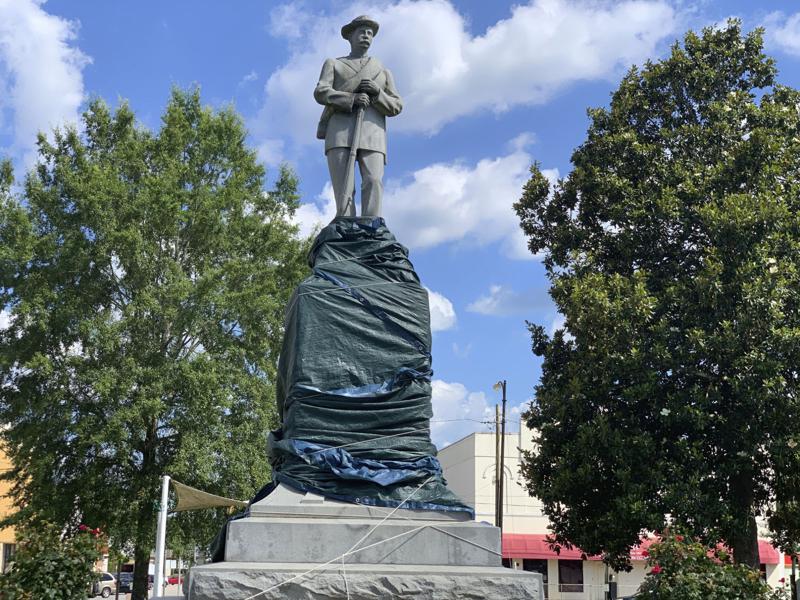Justin Bogie: Tax cuts seem to be everywhere – except in Alabama’s future

Kansas, one of a handful of states alongside Alabama that still fully taxes the sale of food, recently announced a bipartisan plan to “Axe the Food Tax.” Just before Thanksgiving, North Carolina Gov. Roy Cooper signed a budget into law that will make sweeping changes to the state’s tax code, fully repealing the corporate income tax by the end of the decade and cutting the personal income tax rate by 1.26% over the next five years. And the tax cuts that North Carolina just enacted and that Kansas is proposing are not outliers. According to the Tax Foundation, North Carolina became the 12th state to enact personal or corporate income tax rate cuts in 2021. So, what did Gov. Kay Ivey and the Alabama Legislature do in 2021, and what could be on the horizon? Despite taking more revenue from citizens than ever before, there was no meaningful effort to reduce taxes this year. Instead, the 2021 Regular Legislative Session was consumed by a failed effort to legalize, and of course, heavily tax casino-style gaming in Alabama. Lawmakers also found time to legalize the use and sale of medicinal marijuana in Alabama, which could mean financial windfalls for state government and the chosen few businesses allowed to grow, process, and distribute marijuana in Alabama. Given the progress made by other states and Alabama’s failure to pass any meaningful tax reforms this year, surely they are coming in 2022, right? If tax cuts are in the cards, our elected state leaders are not talking about them. Most lawmakers seem focused on how to spend money that has already been taxed from citizens or find ways to take even more. Just this week, State Sen. Greg Albritton, chairman of the Senate general fund budget committee, said that he expects gaming legislation to be a hot topic when the legislature reconvenes on January 11. According to a report from Yellowhammer News, Albritton said that he was hopeful gaming legislation would pass in the upcoming session. And while he said getting control of existing gaming in the state was a driving factor, money may be the biggest motivation. Albritton said, “We’ve got to have some taxing on it. We’ve got to have some benefits on it.” It was estimated that the 2021 gaming legislation would have brought in $260 million to $393 million annually, just from a new tax on gaming revenue. Much of that revenue would have, of course, come out of the pockets of Alabamians. What are other priorities? Sens. Del Marsh and Bobby Singleton have bonuses for retired state workers and teachers on their minds. Marsh’s pre-filed bill would give a minimum bonus of $300 to retirees. Senate education budget chairman Arthur Orr has indicated support not only for retiree bonuses but another pay raise for the state’s teachers. If those priorities pass, Orr has said that it might be the right time to look at limited tax breaks for retirement age and lower-income Alabamians. But surely Gov. Kay Ivey is talking about taking less money from the people of Alabama? Not exactly. On Monday, Ivey announced a state-sponsored plan to expand electric vehicle use in Alabama. Interestingly, when asked if she would move to an electric vehicle, Ivey said her car is “still in good shape,” but she might consider a change in the future. Perhaps Ivey is like many other Alabamians who don’t know much about or have little interest in driving an electric vehicle. According to the Alabama Department of Revenue, nearly five million passenger vehicles were registered in 2020. Less than 3,000 of those vehicles were electric. Are these really the major priorities for Alabama citizens? If the recent gubernatorial election in Virginia is any indication, no. After a 12-year drought in statewide elections for Virginia Republicans, Glenn Youngkin was able to win because he focused on conservative principles such as school choice and lowering taxes. Exit polling conducted by Cygnal found the driving issues for Youngkin voters were education, taxes, the economy, and public safety, among others. Electric vehicles and expanded gambling appeared nowhere on the list. Few would argue that Alabama is a conservative state. Yet, the current tax and spend priorities of state lawmakers do not reflect conservative principles. If the governor and Republican supermajority legislature want to get back to those roots, they need only look to other states for inspiration. Justin Bogie is the Senior Director of Fiscal Policy for the Alabama Policy Institute.
Steve Marshall celebrates victory; vaccine mandate blocked in federal court

Attorney General Steve Marshall is celebrating a victory today in the lawsuit he filed against the Biden Administration in early November. On Tuesday a Louisiana U.S. district judge blocked a federal COVID-19 vaccine mandate for health care workers, The Advertiser reported. The mandate requires America’s healthcare workers to be vaccinated against COVID-19 or lose their jobs. Marshall joined attorneys general from Louisiana, Montana, Arizona, Georgia, Idaho, Indiana, Kentucky, Mississippi, Ohio, Oklahoma, South Carolina, Utah, and West Virginia. The U.S. District Court for the Western District of Louisiana granted a motion for a preliminary injunction halting the vaccine mandate issued on November 4 through the Center for Medicare and Medicaid Services (CMS). Judge Terry A. Doughty declared that the Biden administration lacked the constitutional authority to issue such a broad decree. Doughty wrote, “If the separation of powers meant anything to the Constitutional framers, it meant that the three necessary ingredients to deprive a person of liberty or property—the power to make rules, to enforce them, and to judge their violations—could never fall into the same hands. If the Executive branch is allowed to usurp the power of the Legislative branch to make laws, two of the three powers conferred by the Constitution would be in the same hands.” Doughty continued, “If human nature and history teach anything, it is that civil liberties face grave risks when governments proclaim indefinite states of emergency. During a pandemic such as this one, it is even more important to safeguard the separation of powers set forth in our Constitution to avoid erosion of our liberties.” Marshall stated in a press release, “President Biden has abandoned persuasion for brute force in launching an unprecedented series of federal mandates aimed at compelling most of the adult population of the United States to get a COVID-19 vaccine, but his unlawful, unconstitutional, and un-American decrees are being met head-on in court by the force of law.” Marshall added, “Each of the Biden administration mandates has distinct and severe legal deficiencies that warrant distinct and severe responses from the states. This is about so much more than vaccines. It’s about planting a flag to say that enough is enough. The federal government’s power is not boundless, but if we are not vigilant to fight here and now, there will be no going back.”
Steve Flowers: Reapportionment done; Legislative races begin

The new lines are finally drawn for next year’s state legislative and congressional elections. They have just made it under the wire for the late January qualifying deadline and the May 24, 2022 primary elections. The legislature should not be blamed for the late formulation of the lines because the U.S. Census Bureau did not produce the final detailed figures until September 30, 2021. Therefore, the state legislature did a Herculean job by getting the lines drawn so quickly. They went into special session almost immediately after they received the numbers. However, their immediacy could be because it affects them immensely. Alabama’s legislature is tasked with drawing their own legislative lines, as well as the congressional lines for their state, as is called for by both the United States and Alabama Constitutions. Folks, that is the reason that the census is taken every 10 years. It is mandatory by the constitution to allow for all congressional and legislative districts to have approximately the same number of people. This rule is referred to constitutionally and legally as the one-person, one-vote rule. Alabama’s Constitution of 1901 patterns mandated reapportionment every 10 years like the U.S. Constitution does for Congress. However, Alabama lawmakers simply ignored this mandate for 60 years. the legislative lines had become so unfairly unconstitutionally out of proportion that it was comical. As a young page, I observed the representation in the House and knew something was wrong. My county of Pike had 25,000 people and we had two representatives and the Huntsville area had grown to over 200,000 people and they had only two representatives. Lowndes County had a population of 15,000 and had one senator. Jefferson County with a population of 635,000 had one senator. The Black Belt had gotten an unfair distribution of seats during the 1901 constitutional approval debate and had not relinquished their legislative power. Finally, the federal courts stepped in and dictated one-man, one-vote districts in the now-famous Reynolds v. Sims case in the 1960s, which set the one-man, one-vote principle for the entire nation. It still amazes me that the good people of Jefferson, Madison, and essentially all of north Alabama allowed this incredible injustice to exist for 60 years. The recently completed Reapportionment Session has drawn the new lines for our seven congressional seats, our 35 state senate seats, and 105 seats in the state house of representatives, as well as our eight-state board of education districts. It was thought that there may have to be two sessions – one for congressional and one for legislative redistricting. However, we in Alabama dodged the bullet and did not lose a congressional district as was expected. By keeping our seven seats, it made it much easier. However, kudos and accolades go out to the Reapportionment Committees and especially the Chairmen, Senator Jim McClendon (R-St. Clair) and Representative Chris Pringle (R-Mobile). They have worked diligently since the beginning of the quadrennium. Working on reapportionment is a tedious task, however, very important and powerful. They had to be aware of political and legal parameters. We in Alabama are still under the eye of the U.S. Justice Department because of the 1965 Voting Rights Act. Therefore, they have to start with the premise that African American voters have to be given preference and there needs to be a proper number of majority-minority legislative districts. They had to begin the congressional redistricting with the fact that the 7th Congressional District of Terri Sewell had to be looked at and protected. The paramount concern was self-political preservation so the most ardent task was protecting the districts of incumbent legislators. The courts have held that partisan and incumbent protection is permissible as long as you do not get too carried away with gerrymandering. The supermajority Republican legislature was attentive to what might trigger an adverse judicial ruling on the redistricting plans. Chairman Chris Pringle was very attentive to not creating new Republican districts. They figured that the 77 Republican to 28 Democrat advantage in the House and the 27 Republican to 8 Democrats in the Senate was enough. The courts might see that as regressing or suppressing African American Democratic political power. It was actually difficult to avoid adding new Republican seats because the population growth has been in Republican-leaning enclaves. The Democratic Senators and House members are quietly pleased with the plan because it was incumbent friendly. In other words, the cardinal rule in reapportionment is that you take care of yourself first. Party, race, and colleagues come second. Under the new congressional lines, we will more than certainly still have six Republican and one minority Democratic district. See you next week. Steve Flowers is Alabama’s leading political columnist. His column appears in over 60 Alabama newspapers. He served 16 years in the state legislature. Steve may be reached at: www.steveflowers.us.
Judge stops federal COVID-19 vaccine mandate in Medicare, Medicaid facilities in 10 states

U.S. District Judge Matthew T. Schelp on Monday ordered a preliminary injunction against the Biden Administration, stopping mandated COVID-19 vaccinations for health care workers in Centers for Medicare and Medicaid Services (CMS) facilities. “Because it is evident CMS significantly understates the burden that its mandate would impose on the ability of healthcare facilities to provide proper care, and thus, save lives, the public has an interest in maintaining the ‘status quo’ while the merits of the case are determined,” Schelp wrote in a 32-page memorandum and order in the U.S. District Court in the Eastern District of Missouri. Missouri Republican Attorney General Eric Schmitt led a 10-state coalition filing the lawsuit on November 5 to stop the CMS vaccine mandate. On the courthouse steps in St. Louis, Schmitt, a candidate for the seat of retiring Republican U.S. Senator Roy Blunt, stated many will benefit from the ruling. “This is a significant ruling and the first of its kind in the country,” Schmitt told reporters. “What the court said today was CMS and the Biden administration has no statutory authority to do this, none whatsoever.” Starting in late October, Schmitt led coalitions of states in filing three lawsuits against federal vaccine mandates – for federal contractors and federally contracted employees, for the Occupational Safety and Health Administration’s mandate on private employers with 100 or more employees, and CMS. The Fifth U.S. Circuit Court of Appeals in New Orleans blocked the private-sector OSHA mandate earlier this month. Schmitt said Monday’s ruling will help all Missourians and all served in CMS facilities. “Our office may have led the charge on this, but it is the health care workers in Missouri and across the country, it’s the rural hospitals here and elsewhere facing certain collapse due to this mandate, and it’s the patients of those hospitals who are the real winners today,” Schmitt said. Judge Schelp stated five times in the ruling that it’s likely Schmitt and the coalition will ultimately succeed if the ruling is appealed. The ruling only applies to the 10 states in the lawsuit – Alaska, Arkansas, Iowa, Kansas, Missouri, Nebraska, New Hampshire, North Dakota, South Dakota, and Wyoming. “I would expect this to be appealed and I would expect this to go all of the way to the Supreme Court,” Schmitt said. “But the fact is we won.” The ruling stated CMS lacked clear authorization from Congress to mandate the COVID-19 vaccine. Currently, CMS doesn’t require any vaccinations for health care workers. “CMS failed to adequately explain its contradiction to its long-standing practice of encouraging rather than forcing – by governmental mandate – vaccination,” Schelp wrote. “For years, CMS has promulgated regulations setting the conditions for Medicare and Medicaid participation; never has it required any vaccine for covered facilities’ employees – despite concerns over other illnesses and their corresponding low vaccination rates.” Schelp also stated CMS violated its own regulations by not accepting comments on policies. “Moreover, the failure to take and respond to comments feeds into the very vaccine hesitancy CMS acknowledges is so daunting,” Schelp wrote. Schelp highlighted the vaccine mandate’s negative impact on staffing at rural hospitals. “As an example, for a general hospital located in North Platte, Nebraska, implementation of the mandate would result in the loss of the only remaining anesthesiologist,” Schelp wrote. “Understandably, without an anesthesiologist, there could be no surgeries – at all. Thus, such a loss irreparably causes a cascading effect on the entire facility and a wide range of patients. Other examples show the mandate’s far-reaching implications not just on the administration of health care itself, but the functioning of the facilities in general.” Schmitt said the virus will always be present and the federal government needs to understand citizens and their rights. “The truth is COVID is with us and there is always going to be a variant,” Schmitt said. “But I think the people have had enough of the government locking people down. They have had enough of government instituting mask mandates and vaccine mandates. Every time there’s an overreach, we’re going to push back.” Bureaucrats who have never driven the back roads of Missouri or visited its rural hospitals have no idea of the effects of the vaccine mandate, Schmitt said. “Here in flyover country, we’ve had enough and we’re going to fight back every single time they try to take our freedoms away,” Schmitt said. By Joe Mueller | The Center Square Republished with the permission of The Center Square
Confederate group opposing suit over Tuskegee monument site

A Confederate heritage group will fight an Alabama county’s lawsuit that could lead to the removal of a rebel monument in the heart of nearly all-Black Tuskegee, the group’s lawyer said Tuesday. While Macon County has asked a court to give it the deed to a downtown square where the memorial has stood for 115 years — potentially a key first step toward taking down the statue — the United Daughters of the Confederacy owns the square legally and wants the monument to remain, said Jay Hinton, an attorney for the group, in its first public response to the court fight. “All of those members have ancestors who are honored by that monument,” he said. The monument, located in front of the county courthouse in a city of 9,400 that is 97% Black, has been the subject of on-and-off protests and attempts to remove it for decades. The monument went up at a time when groups all over the South were erecting Civil War memorials to honor rebel troops and portray the cause of the slave-holding Confederacy as noble. Hundreds have been taken down in recent years as they came to be seen as symbols of racial oppression against Black people. Controlled by whites at the time despite having a majority black population, Macon County in 1906 gave a plot at the center of Tuskegee to the Confederate group for use as the site of a rebel monument and as a “park for white people,” records show. The county now contends the land transfer was unconstitutional, partly because of the racial clause. The United Daughters of the Confederacy, which has about a dozen members in Tuskegee, never attempted to exclude anyone from the park because of race and considers the racial restriction offensive, Hinton said, but the wording doesn’t mean that the county should get the land back. “We believe we have owned and still own the square,” he said. While the group has worked with the county and city to come to an agreement, “the only proposal that continued to be offered was simply for the chapter to pay to take down its monument, move it and give the county back the land,” he said. The group refused. A Tuskegee City Council member used a saw to damage the statue earlier this year in hopes it would topple over, but it didn’t, and the county subsequently filed suit in September. The United Daughters of the Confederacy has since spent several thousand dollars on repairs, Hinton said. Located about 40 miles (64 kilometers) east of the state capital of Montgomery, Tuskegee is the home of Tuskegee University. The town airfield was where the nation’s first Black military pilots, the Tuskegee Airmen, trained during World War II. Republished with the permission of the Associated Press.
New memorial to depict Rosa Parks at spot of 1955 arrest

A new memorial to Rosa Parks will depict the one-time Alabama seamstress near the spot where she was arrested for refusing to give up her bus seat to a white man in 1955. The dedication of the monument will be held Wednesday on “Rosa Parks Day” to begin a week of activities in Alabama’s capital reflecting on Parks and her actions, which provided the impetus for the start of the modern civil rights era 66 years ago. Created by Montgomery artist Ian Mangum, the memorial is composed of a series of pieces of black steel that were formed to create an image of Parks. The installation is identical to one that Mangum created for Maxwell Air Force Base in Montgomery, the Montgomery Advertiser reported. Parks, an activist with the NAACP, gained worldwide fame after refusing to give up her bus seat to a white man on Dec. 1, 1955. Her arrest led to the yearlong Montgomery Bus Boycott, which propelled the Rev. Martin Luther King Jr. into the national limelight. A subsequent lawsuit led to a ruling that outlawed racial segregation on Montgomery’s buses. The memorial is located outside the Rosa Parks Museum, which is near the place in downtown Montgomery where Parks was arrested. Other events will be held in the city over the next week to honor Parks, who died in 2005, and recall the legacy of the bus boycott. Republished with the permission of the Associated Press.


